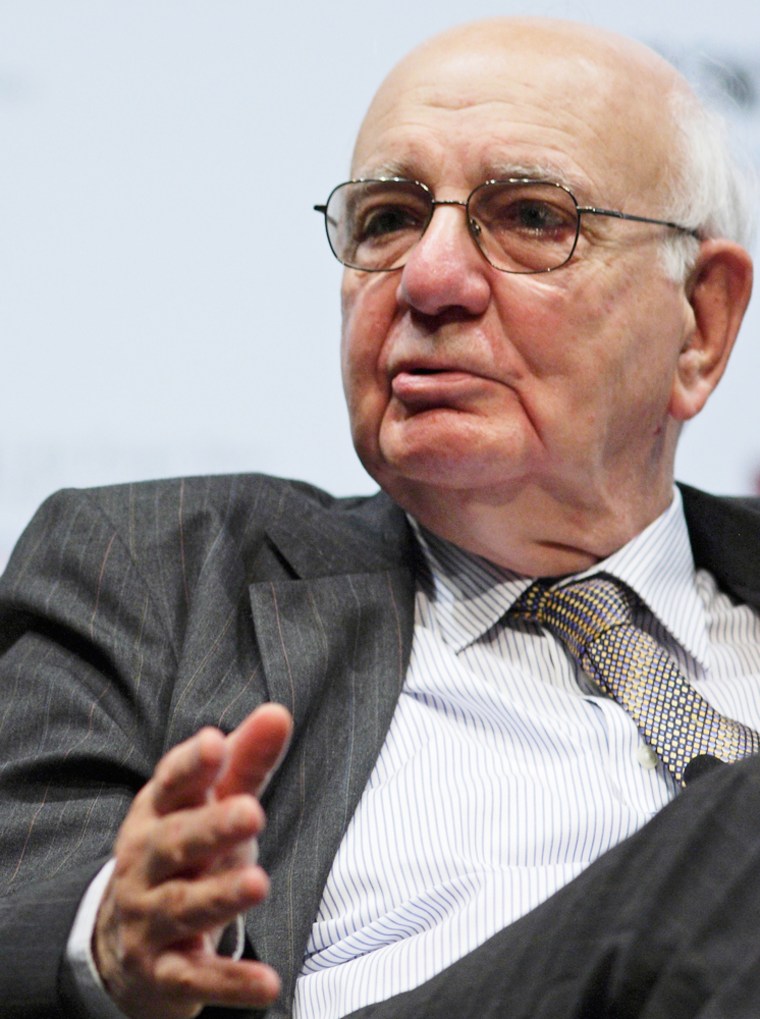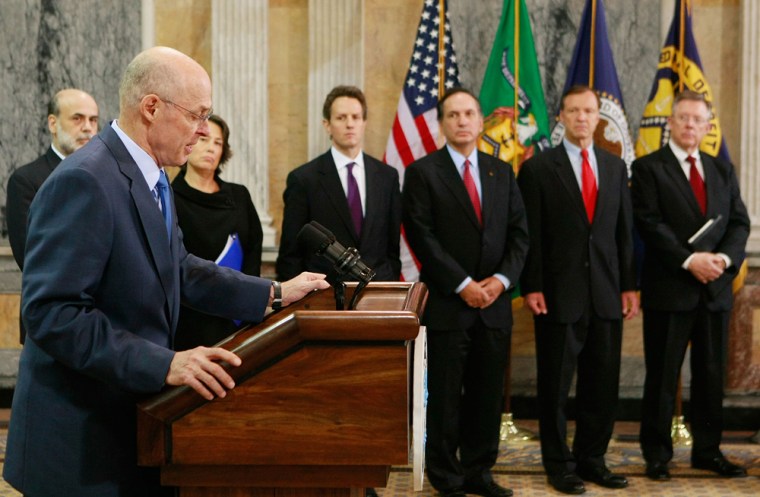Now that Sen. Barack Obama has won the presidency, the spotlight will shift quickly to his plan for repairing the damaged economy. And one of his most important decisions will be his choice for treasury secretary, a powerful position that has gained even more importance since Congress approved a $700 billion financial bailout package last month.
The new treasury secretary will occupy an unenviable position -- not since Franklin Roosevelt took office in 1933 has a president inherited an economy in such disastrous shape.
Obama and his economic advisers have agreed that taking measures to stabilize the economy would be his first step in the White House. He has said it is urgent to rebuild the housing market and restore stability to the stock market.
But those are broad talking points. The task of handling the nuts and bolts to steer the economy out of crisis belongs to whoever succeeds Treasury Secretary Henry Paulson.
Paul Light, a professor at New York University's Wagner School of Public Service who studies the presidential appointments process, says the pivotal importance of the treasury secretary's role this year puts enormous pressure on the next president.
"This is likely to be one of the first nominees announced, and it's going to have a major effect on the stock market and markets in general," says Light. "This is one where the market and all the economists out there who are watching will render judgment immediately. We'll know the quality of the appointment just by looking at the market that day."
So who is likely to fill that spot?
Among Obama's senior economic advisers, Robert Rubin's name is often floated as a potential treasury secretary.
Rubin already served in the post under President Clinton and gained firsthand experience on the international scene during the Latin American and Asian financial crises in the 1990s. His stance on the regulation of derivatives could work against him, though.
While in office, Rubin opposed increased regulation of the complex financial products Warren Buffett later called "financial weapons of mass destruction." That leaves him vulnerable to criticism from those who say derivatives contributed to the crisis that has rocked Wall Street.
Robert Kuttner, co-editor of The American Prospect and author of "Obama's Challenge: America's Economic Crisis," supports Obama but thinks the Rubin choice would be a poor one. He says Rubin is "tainted" as a "champion of deregulation."
"I think anybody who worked hand in glove with Wall Street, or on Wall Street during the past 15 years is almost disqualified. They were part of the problem," says Kuttner. "If you want to restore confidence on the part of the general public you need somebody who comes to the job with clean hands."
Rubin's protégé
That logic would also disqualify Lawrence Summers, another Obama adviser, Rubin's protégé and successor as treasury secretary. Despite Summers' impressive on-the-job credentials, controversy surrounding his forced resignation as president of Harvard University could also create turmoil when stability is the goal.
"He comes with a fair amount of baggage," says Light. "I think Larry Summers was a good treasury secretary, but I don't think his nomination would be widely acclaimed -- in fact I think it would generate some upset in certain communities."

"Let me tell you who I associate with," said Obama. "On economic policy, I associate with Warren Buffett and former Fed Chairman Paul Volcker."
"Those are the people," he went on to say, "who have shaped my ideas and who will be surrounding me in the White House."
To some, Volcker would be a comforting choice for treasury secretary. He has the necessary gravitas, experience and, perhaps most importantly, distance from any factors that contributed to the current crisis. Volcker recently appeared with Obama on the campaign trail, at a jobs summit event in Florida.
Paul Light says Volcker's reputation as a public service-minded economist and his distance from Wall Street make him a strong Obama selection, even if he served in a temporary role.
"I think you want one of these giants," says Light. "And there aren't that many of those giants around."
Two key players who were not affiliated with either Obama or his Republican rival John McCain also could be among those considered.
Timothy Geithner and Sheila Bair have both attracted attention for their efforts to stem the tide of financial crises, and could be among those considered by either candidate for the treasury secretary job.
As chairman of the Federal Reserve Bank of New York, Timothy Geithner has become an increasingly recognizable and respected figure as the economic crisis has unfolded. He helped broker the emergency sale of failing brokerage to JPMorgan Chase in March. And he stood next to Paulson last month when Paulson announced plans to invest $250 billion of taxpayer funds into the banking industry. Geithner also gained international experience navigating the financial crises of the 1990s under Robert Rubin at Treasury.
Light describes Geithner as "a very effective public servant" who could seamlessly step into the role. But the prospect of having to replace Geithner at one of the most important regional Federal Reserve banks in the midst of a financial crisis could make this an unattractive proposal.
Standing shoulder-to-shoulder with Paulson at that same October meeting was another potential pick for either McCain or Obama. Sheila Bair, as chairwoman of the Federal Deposit Insurance Corp., engineered the seizure of IndyMac and has used her agency's temporary ownership to test a mortgage refinancing program that could be applied on a larger scale. The success of that program gives Bair real-world experience at the helm in a sector key to the future of the economy's well-being.
James Galbraith, economics professor and author of "The Predator State," says renegotiation of mortgages is the top priority for the next president because economic recovery is dependent on keeping people in their homes by whatever means necessary.
"The problem will not be solved until you deal with the other side of the equation," says Galbraith. "That's the real economy -- the collapse of the housing sector, which is behind the collapse of the financial sector."
As a Republican, Bair could be a strong selection for Obama, who has touted the importance of having a bipartisan Cabinet.
Regardless of who the next treasury secretary is, most agree that a new appointment must be made.
According to Paul Light, Paulson has "expended a lot of personal capital" engineering bailout strategies and plans, undermining his ability to be effective for much longer.
Kuttner calls the idea of Paulson staying on "terrible."
While the experts agree challenges ahead for the next treasury secretary will be enormous, they also point to the complexity of the job, and say the entire team of economics advisers will be just as important.
"I think we'll need to look at the package of appointments," says Light. "The deputy secretary, under secretary, chair of (the) Council of Economic Advisers -- the best approach is to announce your economic team as a whole, to really emphasize the experience of the people who'll try to fix this mess."
